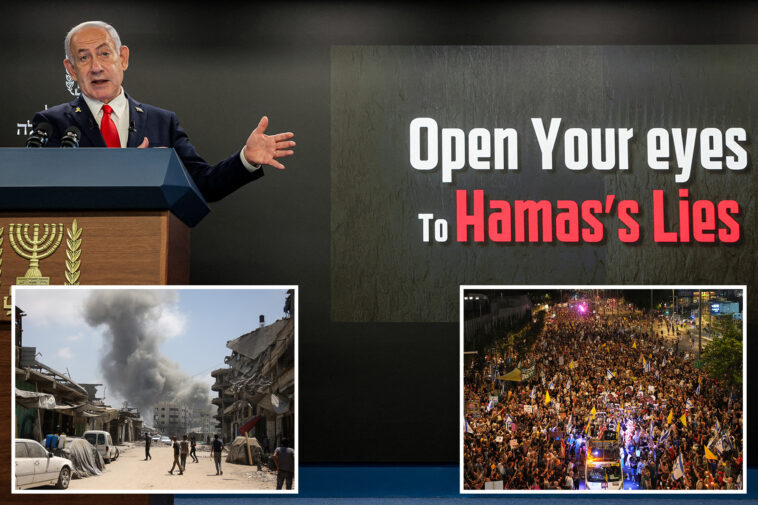Israeli Prime Minister Benjamin Netanyahu laid out Sunday his five goals to seize Gaza City and free it from Hamas — as he faces mounting pressure, with one world leader warning that the military incursion could turn into his own “Vietnam.”
Netanyahu called his plan to invade Gaza City “the best way to end the war” quickly, as he laid out the five-point plan for peace.
“One, Hamas disarmed. Second, all hostages freed. Third, Gaza demilitarized. Fourth, Israel has overriding security control. And five, non-Israeli peaceful civilian administration,” the premier summarized.
“That’s our plan. Given Hamas’s refusal to lay down its arms, Israel has no choice but to finish the job and complete the defeat of Hamas,” Netanyahu added.
Netanyahu maintains that the operation won’t lead to the full military occupation of Gaza, instead, it will focus on targeting Hamas’ terrorist cells stationed in Gaza City.
The premier did not offer a timeline on how the military incursion would proceed, saying only that it would be done “fairly quickly.”
He likened the operation to the military takeover of the southern city of Rafah, another controversial incursion that was once tapped as the final tactic to eliminate Hamas last year, only for the terror group to re-emerge elsewhere in Gaza.
Experts have also expressed doubts that such an operation could be speedily resolved, with many warning that it would only indefinitely extend the war, which has raged on for nearly two years.
As the United Nations holds an emergency meeting this weekend to discuss the Gaza City incursion, Italian Foreign Minister Antonio Tajani presented a stark warning to Netanyahu.
“The invasion of Gaza risks turning into a Vietnam for Israeli soldiers,” he told the daily Il Messaggero, referencing the years-long quagmire and losses in Vietnam that ended with the withdrawal of the US military.
When news of the incoming operation broke last week, Colin Clarke, a counter-terrorism expert at the New York-based Soufan Group, told The Post that the incursion would put more IDF soldiers at risk of being attacked by not only Hamas, but also by armed insurgents opposing the occupation.
“This puts the IDF under new risks, with the soldiers having to deal with regular ambushes, improvised explosions and sniper fire from an insurgency,” Clarke warned.
The plan to invade Gaza City, which IDF chief of staff Eyal Zamir also opposes, has also caused tens of thousands to march in the streets of Tel Aviv to oppose their government’s action, calling for a cease-fire agreement in its place to free the remaining 50 hostages.
Netanyahu and his cabinet have claimed that the military operation is still the best way to free the captives, only 20 of whom are believed to still be alive.
The embattled premier also faces pressure from members of his far-right coalition accusing him of falling short on the goal to take over Gaza.
Bezalel Smotrich, a member of Netanyahu’s security cabinet, said he has lost faith in Netanyahu’s ability and desire to lead Israel to victory.
With Post wires








